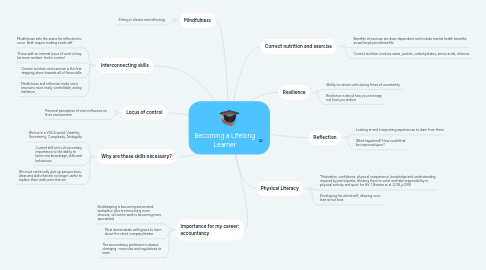Becoming a Lifelong Learner
作者:Luke Atkinson

1. Mindfulness
1.1. Sitting in silence and reflecting
2. Locus of control
2.1. Personal perception of one's influence on their environment
3. Interconnecting skills
3.1. Mindfulness sets the scene for reflection to occur. Both require looking inside self
3.2. Those with an internal locus of control may be more resilient: feel in control
3.3. Correct nutrition and exercise is the first stepping stone towards all of these skills
3.4. Mindfulness and reflection make one's emotions more easily controllable, aiding resilience
4. Why are these skills necessary?
4.1. We live in a VUCA world: Volatility, Uncertainty, Complexity, Ambiguity
4.2. Current skill set is of secondary importance to the ability to learn new knowledge, skills and behaviours
4.3. We must continually give up perspectives, ideas and skills that are no longer useful to replace them with ones that are
5. Importance for my career: accountancy
5.1. Bookkeeping is becoming automated: workplace jobs are becoming more obscure, so human work is becoming more specialised
5.2. Must demonstrate willingness to learn about the client company/trader
5.3. The accountancy profession is always changing - new rules and regulations to learn
6. Resilience
6.1. Ability to remain calm during times of uncertainty
6.2. Resilience is about how you recharge, not how you endure
7. Reflection
7.1. Looking at and interpreting experiences to learn from them
7.2. What happened? How could that be improved upon?
8. Correct nutrition and exercise
8.1. Benefits of exercise are dose-dependent and include mental health benefits as well as physical benefits
8.2. Correct nutrition involves water, protein, carbohydrates, amino acids, vitamins
9. Physical Literacy
9.1. "Motivation, confidence, physical competence, knowledge and understanding required by participants, allowing them to value and take responsibility in physical activity and sport for life" (Shearer et al. 2018, p.239)
9.2. Developing the whole self, allowing us to lead active lives


